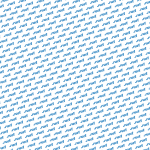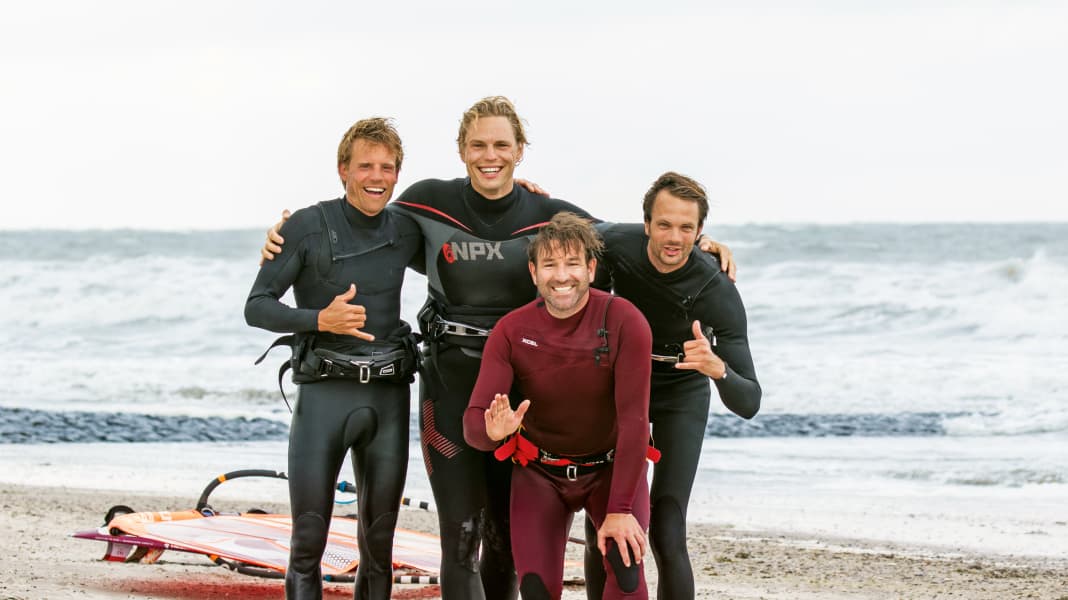
A muffled drumming, then nothing. I realise how every cell in my body is resisting processing this sound. There it is again. Louder this time - the ceiling goes over my ears. For a second, my system reports relaxation, but then the door to my room bangs open loudly and with full force. In a blur, I recognise a middle-aged, middle-aged figure with a kitchen smock strapped around his waist. "WHERE ARE YOU?!!!" Snorting like a steam boiler, the boss of my civilian job stands in my small room of about nine square metres and literally whips me out of bed. "I need twelve buckets of potatoes for lunch today!" With these words, the woman left my room again and added in the corridor "...in five minutes in the potato cellar!"
It may sound strange after this introduction, but it was the most carefree time imaginable. Civilian service. Back then, Norderney was a kind of insider's tip for civilian service deluxe, with beaches, surfing and partying. After my time, word got around more and more until this great invention was finally abolished as a substitute service for compulsory military service. I worked at a family holiday centre run by the Diakonisches Werk, with the address "Am Weststrand 1". That's right, the house numbers increased inwards towards the island, so I was travelling directly behind the beach chairs with my hoover and potato peeling knife. The fact that the boss often reminded me to be punctual didn't bother me at all, as I was virtually irredeemable and earned more or less nothing. On the morning in question, I had fallen out of some beach chair just an hour earlier, which had been hijacked for the end of the evening after a party in the "King" followed by a night surf.
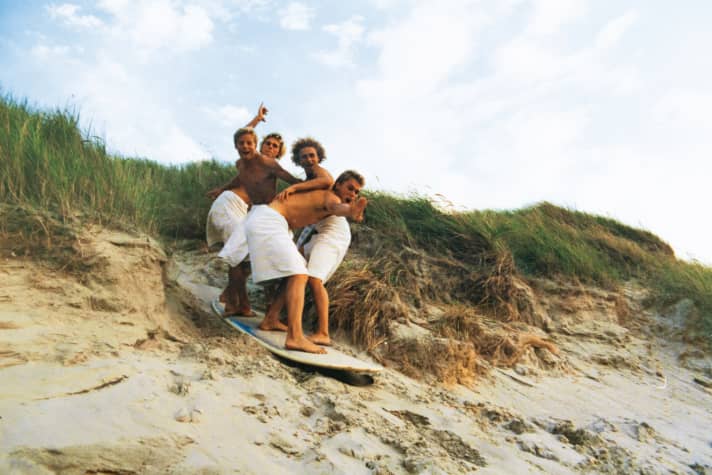
Basically, it didn't matter, because I had my peace and quiet in the potato cellar - and Heiner Bruns. The potato cellar was right next to his workshop. Caretaker Bruns listened to the local radio station every day and was in a good mood. I was the only man on the staff besides him, and I felt that I was his favourite colleague after just a few days. We got on really well. In winter, the holiday resort was without guests for two months and the two of us were on our own. In addition to all sorts of repairs and renovations, I built him two custom-made cases for his motorbike helmets and he welded me the best bike trailer a windsurfer has ever owned.
Best Time of my Life
And that brings us to the most important part of my time as a civilian: windsurfing. I would describe Norderney as the best wave spot in Germany. With its east-west orientation, westerly winds are sideshore on the East Frisian Islands and Norderney picks up the best waves of all the islands - at least around high tide, because at low tide the waves lose their power on a sandbank about a kilometre off the island. The town of Norderney is a car-free zone, so a good bike trailer is an essential tool for every windsurfer. I spotted mine on the island about ten years after my civilian service, having passed it on to the next generation of civilians.
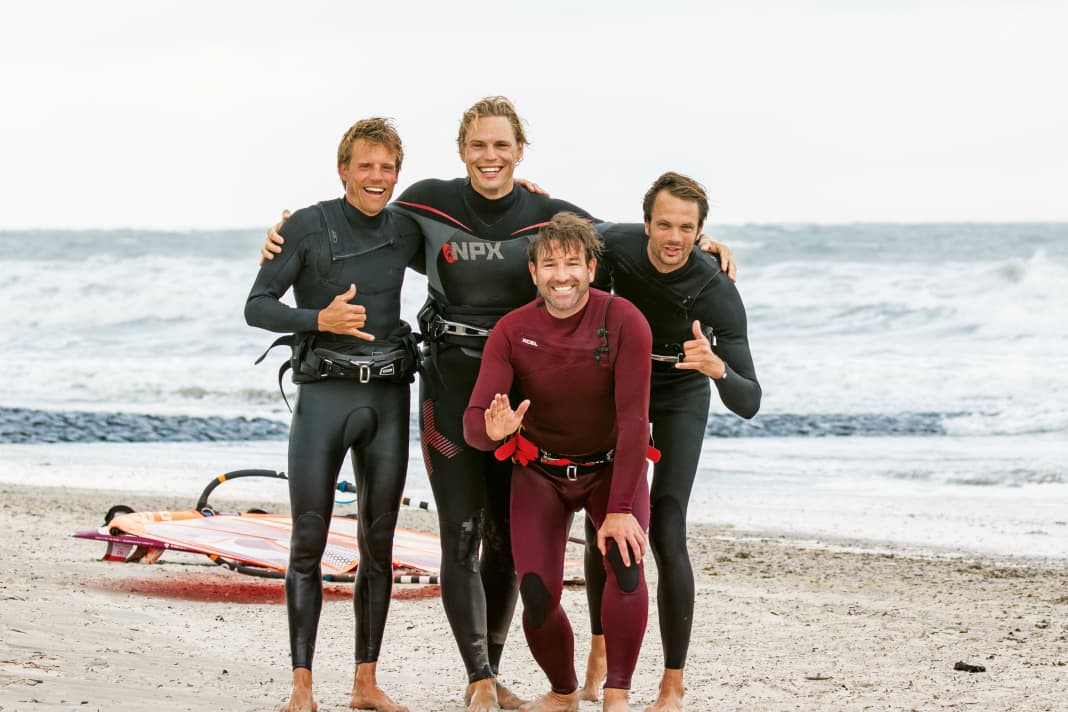





In my day, there were about 15 windsurfing or wave-riding civilians on the island, plus a whole bunch of windsurfing islanders who were just finishing their A-levels. There were also local greats like Bernd Flessner and Arno Ufen, who I already knew from the scene back then. My working hours were from 7.00 am to around 1.00 pm and then again from 5.45 pm to 7.15 pm. So I had the whole afternoon off and was on the water every free minute - together with the crew I just described.
The Norderneyers included Erik and Freddy, twins whose parents live in Berlin and who were allowed to spend their A-levels alone on Norderney. Their mum is from Norderney and so their parents' house in the middle of the town became the hub for the island's entire windsurfing crew.
My original plan was to go to Kiel to study medicine after my civilian service, but due to a very high numerus clausus, I needed a waiting semester. I extended my time on the island without further ado and started riding contests. At the end of this time, I was on the podium of the DWC Tour, sponsors approached me and I was invited to the World Cup Sylt with a wildcard. Suddenly, the prospect of studying medicine and then working in a clinic no longer seemed so appealing. Without further ado, I decided to start studying sports, which gave me much more freedom to pursue windsurfing more intensively. This decision turned into 20 years of World Cups.
Most of the Norderney crew from back then are only on the island sporadically.
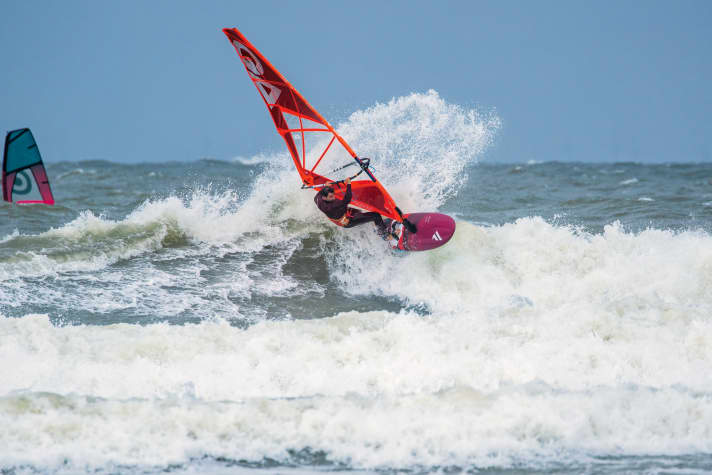
Back to the roots
Erik now runs one of the largest fintech companies in Germany and lives partly in Berlin and partly in Munich. His brother Freddy has also moved to Munich. Arno lives in Bremen as a pilot, and Flessi spends a lot of the year away from the island as a private coach at various Robinson Clubs. I haven't been to the island for years. I do visit East Frisia from time to time to visit my parents, but for a good forecast, Klitmøller is closer for me from Kiel, works more often and is independent of the tide.
In times of corona and border closures, however, everything has suddenly changed. The spots on our doorstep have taken on a whole new meaning since the lockdown began. Here in Germany, we were allowed on the water all the time, but depending on the region, visitors from other federal states were temporarily not tolerated and everyone was restricted to their own area. Here in Schleswig-Holstein, we were on the water at spots that had hardly existed for us before, simply because we usually only focussed on the forecasts in Denmark. Wingfoiling has exploded, everyone is suddenly trying to get the maximum out of the conditions 'around the corner'. In the last 20 years, I've usually been to the Canary Islands in June/July, but this year I took my family to the "Kleines Meer" in East Frisia at the beginning of July, just half an hour from the ferry to Norderney. I had been meaning to visit this island, which has had a lasting influence on my life, for a long time.
I was just standing on the jetty at the "Kleines Meer" and explaining the turnaround to my five-year-old son when my phone rang. It was Erik, excitedly telling me that the forecast for Norderney looked so good and that he was thinking of moving his home office to the island for two days. Of course, I had already scoffed at this and was immediately on board when he invited me and my family to his house, as day tourism was still prohibited at the time. No sooner had we hung up than I got a message from Arno, who had heard from Flessi that I was coming to the island. So the bush radio worked and two days later, when I was greeted by the Norderney island greeting "Hey" at the harbour with the family, the civilian revival evening at the twins' house had already been organised - at a distance, of course.
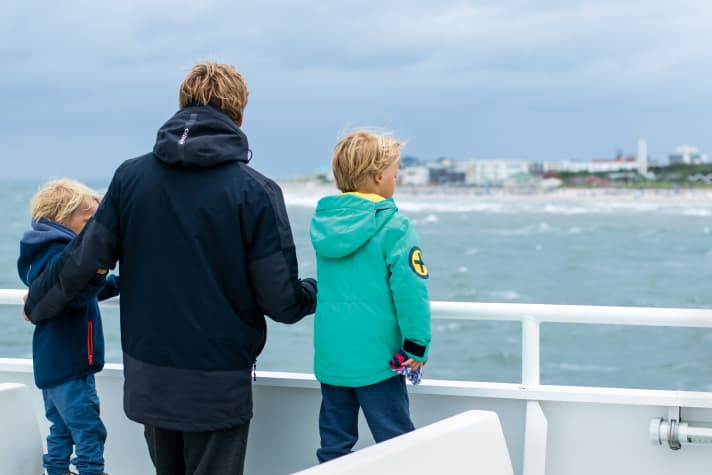
The following windsurfing day was a tough one. At 6.30 in the morning, Erik and I cycled to the Januskopf with two surf trailers and met up with surf instructor and surf tester Christian Winderlich aka Windel, Flessi, Dennis Müller and Daniel, another civilian colleague from back then. They were all at the start so early because the tide was already high shortly after seven. We started the day in a west-south-westerly wind with drizzle, but side-offshore conditions at their best.
After breakfast, Erik opened his home office and I explored the city with the family. The party crowd has now increasingly given way to a more upmarket clientele. "King", "Strandkorb", "Möpken" or "Inselkeller" - all these venues from back then no longer exist. Instead, there are luxury flats, wellness centres and lovely sundowner evenings in the "Milchbar" or the "Surf-Café" right on the spot. The town itself looks much the same as it did back then, apart from the fact that many houses have been rebuilt or renovated in a modern interpretation of the bathhouse style and the entire "House of the Island" no longer exists.
At around 17:00, we set up the second session for the evening high tide. In the meantime, the bad weather had cleared, the wind had picked up and the waves had reached a considerable size. The Januskopf is notorious for its groynes, which during my time as a civilian protruded almost as high as a man from the beach and punished you severely if you were careless. Several Finns and even a board fell victim to the groynes between 1998 and 2000. At present, one of the groynes is almost completely buried under sand, so that you can safely shoot out even in a cross onshore wind and choose a steep ramp in the area of the groyne head.
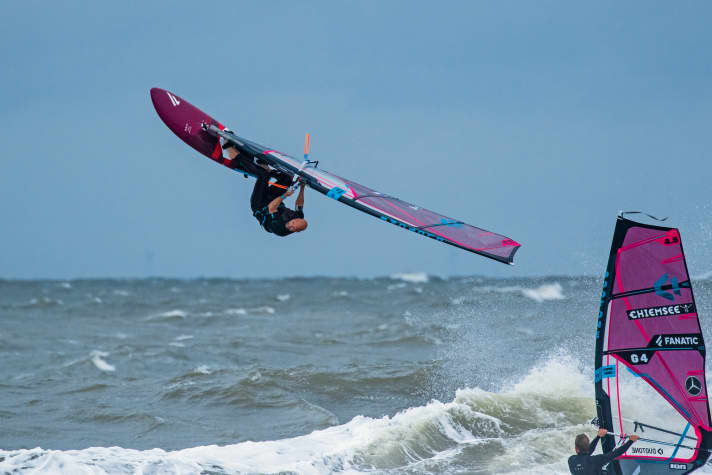
The waves at Januskopf also have a good amount of pressure and sections that invite frontside aerials - otherwise a rarity in Germany. We burnt off all our reserves until the evening hours and ended up back in Erik's living room with a glass of wine and a good meal. Just like 20 years ago, except that I wasn't dragged out of bed the next morning by a grumpy woman in a smock, but by my two sons, who were already very excited because I had promised them a surfing session before we left and Flessi wanted to show them the viewing dune.
In addition to all the suffering and difficult times for so many people, the coronavirus pandemic also offers the opportunity to rediscover your environment and surroundings, revitalise old friendships and change your perspective on so many things you take for granted. Without corona, it would probably have been many more years before we had another session together on Norderney. Only my robot hoover would have reminded me of this formative civilian time with its message on my phone after every cleaning session: "'Janitor Bruns' has finished cleaning and is returning to the dock."
